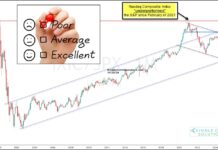Many traders actively watch the market and believe there are always opportunities to make money.
It can seem that way as there is almost always a symbol sitting in the new 52-week high list or another symbol making a great intra-day move.
However, this type of thinking can be dangerous since it makes people believe they could have made money.
Every day presents opportunities to make money, however, not every trader can make money from them. Certain traders operate within different trading styles and timeframes that allow them to profit from very specific market/symbol moves.
With that said, when you feel FOMO (Fear of missing out) you should take a step back and reflect on your trading strategy and timeframe to see if trades are lining up, or if it’s better to wait for the market to present a better setup.
Jumping in the market without a trading style and timeframe makes it much easier to lose money if the market turns around and catches you without a plan for your trade.
While creating a trading strategy is beyond the scope of this article, picking a timeframe should be much easier. One way to pick a timeframe is by looking at your average trade length to find how long you normally hold a position for.
For new traders, it can take time to test different types of trades to figure out what you naturally gravitate towards.
Some people trade intraday—buying and selling their positions by the end of the day while others look for moves that span from a couple of days to months if the trade is working in their favor. Others invest or take trades for the long run, looking for a large trend to continue or form.
The main point is to pick a timeframe and not stray from it so that you can become a master of trading in that time.
Many traders make the common mistake of taking short-term trades and turning them into long-term trades as they wait for the trade to become profitable.
However, this is when a trader should accept that they are either wrong on the trade or decide that they should change how they trade in general.
Therefore, pick a timeframe and stick to it. This will help you develop your trading style and learn what works and what doesn’t. By doing this, you must accept that you will miss trades that operate in different timeframes.
Furthermore, this will help you have the patience to wait for better trade setups or decide that you want to change your trading strategy/timeframe.
Stock Market ETFs Trading Analysis and Summary:
S&P 500 (SPY) 420 pivotal area.
Russell 2000 (IWM) 188 next support.
Dow (DIA) 331 pivotal area.
Nasdaq (QQQ) Broke key support at 334.
KRE (Regional Banks) Could not hold 72.96 the 50-DMA.
SMH (Semiconductors) watching 256 to hold.
IYT (Transportation) 245 next support low.
IBB (Biotechnology) Broke 122.50 support.
XRT (Retail) Watching for a bounce or support to form.
Twitter: @marketminute
The author may have a position in mentioned securities at the time of publication. Any opinions expressed herein are solely those of the author and do not represent the views or opinions of any other person or entity.








